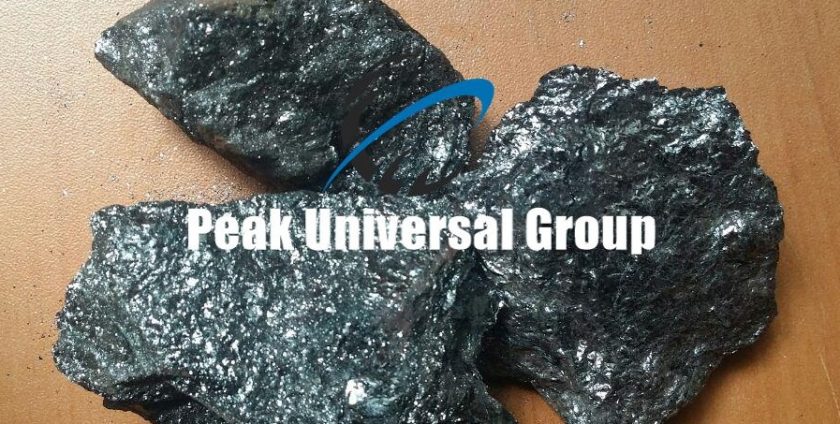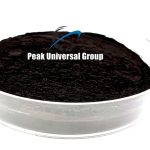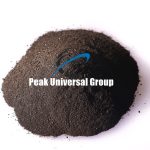
Understanding the Impact of Ash Content on Powder Gilsonite Quality
The Impact of Ash Content on Gilsonite Quality, Gilsonite, also known as natural bitumen or natural asphalt, is a naturally occurring hydrocarbon resin found in certain parts of the world, notably in the Uintah Basin in Utah, USA. This versatile material is used in a wide range of industrial applications due to its unique properties. One crucial aspect of Gilsonite that significantly impacts its quality and utility is its ash content. In this comprehensive blog, we will delve into the different levels of ash content in Gilsonite low ash, medium ash, and high ash and explore how each affects its quality and applications.
What is Gilsonite?
Gilsonite is a solid hydrocarbon resin that occurs naturally in a variety of forms, ranging from black to brown in color. It is primarily composed of carbon, hydrogen, nitrogen, and sulfur, with trace amounts of other elements. Gilsonite is known for its high softening point, excellent adhesion, and resistance to chemicals and water, making it a valuable additive in various industrial processes.
Applications of Gilsonite
Gilsonite is used in several industries, including:
- Oil and Gas: As an additive in drilling fluids and cementing applications.
- Asphalt and Road Construction: Enhances the durability and performance of asphalt pavements.
- Inks and Paints: Provides gloss and improves adhesion in printing inks and paints.
- Foundries: Used as a binder in foundry sands to improve mold quality.
- Adhesives and Sealants: Acts as a reinforcing agent in adhesives and sealants.
Ash Content in Gilsonite
Ash content refers to the non-combustible, inorganic residue that remains after burning Gilsonite. It consists of minerals such as silica, alumina, or carbonates, and is measured as a percentage by weight.
| Grade | Ash Content | Typical Use |
|---|---|---|
| Low Ash | ≤ 5% | Inks, paints, drilling fluids, asphalt |
| Medium Ash | 5%–15% | Sealants, waterproofing, casting |
| High Ash | ≥ 15% | Cost-sensitive, low-performance uses |
Ash content in Gilsonite refers to the non-combustible residue left after the material is burned. It is an important parameter because it influences the purity and performance of Gilsonite in various applications. The ash content can be categorized into three levels:
1. Low Ash Gilsonite
2. Medium Ash Gilsonite
3. High Ash Gilsonite
Each category has distinct characteristics and applications, which we will explore in detail.
1. Low Ash Gilsonite
Low ash Gilsonite typically contains less than 5% ash by weight. This type of Gilsonite is highly pure, with minimal non-combustible residue. The lower ash content results in better performance characteristics, such as higher softening points and improved adhesive properties.
Applications
- Oil and Gas Industry: Low ash Gilsonite is preferred in the oil and gas industry for drilling fluids and cementing applications. Its high purity ensures that it does not introduce unwanted contaminants into the drilling fluid, which can affect the efficiency of the drilling process.
- Asphalt and Road Construction: In asphalt applications, low ash Gilsonite enhances the durability and longevity of pavements. It improves the resistance to rutting, cracking, and weathering, making it ideal for high-performance road surfaces.
- Inks and Paints: The purity of low ash Gilsonite makes it suitable for high-quality printing inks and paints. It provides excellent gloss, adhesion, and chemical resistance, ensuring the final product’s durability and appearance.
- Adhesives and Sealants: Low ash Gilsonite is used in adhesives and sealants to improve their strength and resistance to environmental factors. It ensures a strong bond and long-lasting performance.
Advantages
- High Purity: The low ash content ensures minimal impurities, resulting in better performance and consistency in various applications.
- Improved Performance: Products made with low ash Gilsonite exhibit superior properties, such as higher softening points, better adhesion, and enhanced resistance to chemicals and weathering.
- Versatility: Low ash Gilsonite can be used in a wide range of industries, from oil and gas to inks and adhesives, due to its high quality and performance characteristics.
Disadvantages
- Cost: The high purity of low ash Gilsonite often comes with a higher price tag compared to medium or high ash variants.
- Limited Availability: Low ash Gilsonite is less abundant than its higher ash counterparts, which can lead to supply constraints.
2. Medium Ash Gilsonite
Characteristics
Medium ash Gilsonite typically contains between 5% and 15% ash by weight. This type of Gilsonite strikes a balance between purity and cost, making it a popular choice for many industrial applications.
Applications
- Oil and Gas Industry: Medium ash Gilsonite is used in drilling fluids and cementing applications where the presence of some ash content does not significantly impact performance. It provides good lubricity and stability to the drilling fluids.
- Asphalt and Road Construction: In asphalt applications, medium ash Gilsonite enhances the performance of road surfaces. It provides good resistance to deformation and weathering, making it suitable for various climatic conditions.
- Foundries: Medium ash Gilsonite is used as a binder in foundry sands. It improves the quality of molds and ensures better casting results by providing adequate strength and thermal stability.
- Inks and Paints: While not as pure as low ash Gilsonite, medium ash Gilsonite is still used in inks and paints for its adhesive properties and chemical resistance.
Advantages
- Cost-Effective: Medium ash Gilsonite offers a good balance between performance and cost, making it an economical choice for many applications.
- Adequate Performance: Despite the higher ash content, medium ash Gilsonite still provides satisfactory performance in various industrial processes.
- Wider Availability: Medium ash Gilsonite is more readily available than low ash Gilsonite, ensuring a stable supply for industrial use.
Disadvantages
- Impurities: The higher ash content can introduce impurities that may affect the performance of the final product in some applications.
- Performance Variability: Products made with medium ash Gilsonite may exhibit variability in performance due to the presence of non-combustible residues.
3. High Ash Gilsonite
Characteristics
High ash Gilsonite contains more than 15% ash by weight. This type of Gilsonite is less pure and is often used in applications where the presence of ash content does not significantly impact performance or where cost considerations are paramount.
Applications
- Asphalt and Road Construction: High ash Gilsonite is used in asphalt applications where cost is a major consideration. It provides basic performance characteristics, such as improved adhesion and resistance to weathering.
- Foundries: High ash Gilsonite is used as a binder in foundry sands for lower-cost casting processes. It provides adequate strength and thermal stability for basic mold applications.
- Other Industrial Uses: High ash Gilsonite is used in various low-cost industrial applications where the presence of impurities is acceptable.
Advantages
- Cost Savings: High ash Gilsonite is the most economical option, making it suitable for cost-sensitive applications.
- Adequate Performance: Despite its lower purity, high ash Gilsonite still provides basic performance characteristics required for certain industrial processes.
- Wide Availability: High ash Gilsonite is more abundant than low and medium ash variants, ensuring a stable supply.
Disadvantages
- Lower Purity: The high ash content introduces significant impurities that can affect the performance and quality of the final product.
- Limited Applications: High ash Gilsonite is not suitable for high-performance applications where purity and consistency are critical.
- Performance Variability: Products made with high ash Gilsonite may exhibit significant variability in performance due to the high level of impurities.
1. Purity & Chemical Performance
Lower ash content = higher purity, which improves solubility in oils and solvents — a must for inks, coatings, and drilling muds.
2. Thermal Behavior
Ash doesn’t burn, so higher ash content leads to increased residue and lower BTU value, which impacts combustion and melt behavior.
3. Adhesion & Binding Strength
Higher purity Gilsonite has better resin-like binding properties, making it more effective in adhesives, asphalt binders, and sealing membranes.
4. Environmental & Process Impact
Low-ash grades produce fewer emissions, leave less residue, and result in cleaner processing — ideal for industrial plants and manufacturing.
Choosing the Right Ash Grade for Your Application
| Application | Recommended Ash Content |
|---|---|
| Drilling fluids & cementing | ≤ 5% (Low ash) |
| Modified asphalt (SBS/APP) | ≤ 10% |
| Foundry sand additives | 5%–15% |
| Roofing & waterproofing | 5%–12% |
| Inks & paints | < 5% |
| Budget filler materials | 15%+ (High ash) |
Future Prospects of Gilsonite
As industries continue to seek cost-effective and high-performance materials, the demand for Gilsonite is expected to grow. Research and development efforts are focused on improving the extraction and processing techniques to enhance the purity and performance of Gilsonite across all ash content levels. Innovations in blending Gilsonite with other materials are also being explored to create new products with superior properties.
Choosing Peak Universal Business as Your Gilsonite Supplier
When it comes to sourcing high-quality Gilsonite, Peak Universal Business stands out as a trusted partner. With a commitment to excellence, innovation, and customer satisfaction, Peak Universal Business ensures that you receive the best Gilsonite products tailored to your specific needs. Whether you require low ash, medium ash, or high ash Gilsonite, Peak Universal Business offers a comprehensive range of solutions backed by technical expertise and reliable supply chains.
🔹 What is considered low ash in Gilsonite?
Answer: Low ash Gilsonite contains 5% or less inorganic residue, making it suitable for high-purity applications like drilling, coatings, and polymer blends.
🔹 Does high ash mean low quality?
Answer: Not always. High ash Gilsonite may still be suitable for low-cost or non-critical applications, but it lacks the purity needed for technical-grade products.
🔹 How does ash content affect cost?
Answer: Generally, the lower the ash content, the higher the price, due to increased purity, performance, and demand in technical industries.
🔹 Can ash content be reduced during processing?
Answer: No. Ash is inherent to the raw Gilsonite deposit and cannot be removed economically. Selection of grade depends on mining and screening methods.
Conclusion
Ash content is a key factor in determining the quality and suitability of Gilsonite for specific industrial applications. Whether you’re formulating high-performance asphalt or seeking cost-efficient fillers, selecting the right ash grade ensures both functionality and cost-effectiveness.
The Impact of Ash Content on Gilsonite Quality: Understanding the ash content in Gilsonite is crucial for selecting the right type for your industrial applications. Low ash Gilsonite offers superior performance and purity, medium ash provides a balance between cost and quality, and high ash is a cost-effective option for basic applications. As industries evolve, the demand for high-quality Gilsonite will continue to grow, making it essential to partner with a reliable supplier like Peak Universal Business.
You can Read More about Gilsonite purity vs ash content Here:
How Low Ash Gilsonite (5% Ash) is used?
Medium Ash Gilsonite (5% to 15%)
What is gilsonite used for in drilling?
Difference between Bitumen and Gilsonite
🚀 Call to Peak Universal Business: Choose the Right Grade of Gilsonite for Your Industry
Looking for high-purity or cost-effective Gilsonite tailored to your specific application?
Get in touch with our experts for free consultation, detailed TDS, and reliable bulk supply options.
👉 Need Help Choosing the Right Gilsonite Grade?
We in Peak Universal Business supply Low, Medium, and High Ash Gilsonite in various mesh sizes and custom packaging. Contact us for technical datasheets, pricing, and application advice.
📧 Email: [email protected]
📞 Phone: +971 4 878 2031
🌐 Visit: https://publtd.com/gilsonite/
📦 Bulk Orders | Fast Delivery | Expert Support
📞If You have any other Query or Question you want to ask, Please don’t hesitate to Contact Us
- 0 comment





Leave a Reply